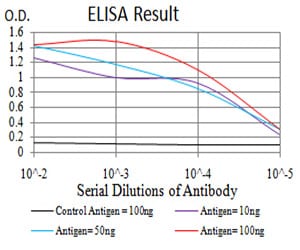


| WB | 咨询技术 | Human,Mouse,Rat |
| IF | 咨询技术 | Human,Mouse,Rat |
| IHC | 咨询技术 | Human,Mouse,Rat |
| ICC | 技术咨询 | Human,Mouse,Rat |
| FCM | 1/200 - 1/400 | Human,Mouse,Rat |
| Elisa | 1/10000 | Human,Mouse,Rat |
| Aliases | SPCH1; CAGH44; TNRC10 |
| Entrez GeneID | 93986 |
| clone | 2G11B8 |
| WB Predicted band size | 80kDa |
| Host/Isotype | Mouse IgG1 |
| Antibody Type | Primary antibody |
| Storage | Store at 4°C short term. Aliquot and store at -20°C long term. Avoid freeze/thaw cycles. |
| Species Reactivity | Human |
| Immunogen | Purified recombinant fragment of human FOXP2 (AA: 641-740) expressed in E. Coli. |
| Formulation | Purified antibody in PBS with 0.05% sodium azide |
+ +
以下是关于FOXP2抗体的3篇参考文献及其摘要:
---
1. **文献名称**: *FOXP2 expression during brain development coincides with adult sites of pathology in a severe speech and language disorder*
**作者**: Lai, C.S.L., Gerrelli, D., Monaco, A.P., Fisher, S.E., & Copp, A.J.
**摘要**: 该研究通过免疫组化分析人胚胎脑组织中FOXP2蛋白的表达模式,发现其在与语言相关的脑区(如基底 ganglia 和皮层)高表达。研究使用了特异性FOXP2抗体,揭示了FOXP2突变可能导致神经发育障碍的机制。
2. **文献名称**: *Parallel FoxP1 and FoxP2 expression in songbird and human brain predicts functional interaction*
**作者**: Teramitsu, I., Kudo, L.C., London, S.E., Geschwind, D.H., & White, S.A.
**摘要**: 研究比较了鸣禽与人类大脑中FOXP2及其同源基因FOXP1的表达模式。通过Western blot和免疫荧光技术,证实FOXP2抗体在鸟类和哺乳动物中的交叉反应性,支持FOXP2在发声学习中的保守功能。
3. **文献名称**: *Humanized Foxp2 accelerates learning by enhancing transitions from declarative to procedural performance*
**作者**: Schreiweis, C., et al.
**摘要**: 该研究利用携带人类FOXP2基因的小鼠模型,通过免疫组织化学和蛋白印迹分析,验证了FOXP2抗体在小鼠脑组织中的特异性,表明人类FOXP2变异可能通过调控皮层-纹状体回路影响运动学习能力。
---
以上文献均涉及FOXP2抗体的实验应用(如Western blot、免疫组化),并关联其在语言、进化或行为研究中的作用。如需更多技术性抗体验证文献,可进一步补充。
The FOXP2 antibody is a crucial tool in studying the FOXP2 protein, a transcription factor encoded by the *FOXP2* gene, which plays a pivotal role in language development, speech, and neural plasticity. FOXP2. a member of the forkhead box (FOX) protein family, regulates the expression of target genes involved in brain development and synaptic signaling. Mutations in *FOXP2* are linked to developmental speech and language disorders, notably childhood apraxia of speech, making it a focus of neurogenetic research.
FOXP2 antibodies are designed to detect and quantify the protein in various experimental models, including human tissues, animal models (e.g., mice, songbirds), and cell cultures. These antibodies are typically produced in hosts like rabbits or mice using immunogenic peptides derived from conserved regions of the FOXP2 protein. They are widely used in techniques such as immunohistochemistry (IHC), Western blotting (WB), immunofluorescence (IF), and chromatin immunoprecipitation (ChIP) to study FOXP2 expression patterns, subcellular localization, and interactions.
Research leveraging FOXP2 antibodies has elucidated its role in vocal learning circuits, cortico-basal ganglia pathways, and neurodevelopmental disorders. Additionally, studies in animal models (e.g., *Foxp2*-knockout mice) highlight its impact on motor coordination and synaptic plasticity. Validated FOXP2 antibodies are essential for ensuring specificity, as cross-reactivity with other FOX proteins or isoforms can compromise data. Commercial antibodies often undergo validation via knockout controls or siRNA knockdown to confirm target specificity. This tool remains indispensable for unraveling the molecular and functional underpinnings of FOXP2 in both health and disease.
×